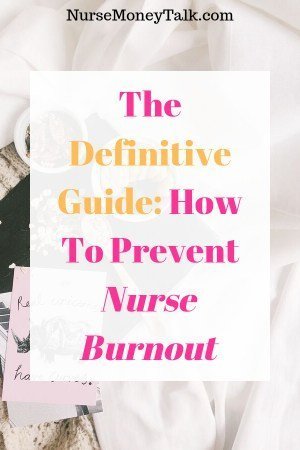Nurse Burnout is a problem, and it affects nurses throughout the country.
- Young nurse.
- Old nurse.
- New nurse graduate.
- Seasoned nurse.
Every nurse is susceptible to getting burned out of their nursing career.
This article’s going to talk about nursing burnout. We’re going to discuss the definition of nurse burnout.
Also what causes nurse burnout, the signs of nurse burnout and nurse burnout symptoms. We’re also going to talk about how to overcome nurse burnout. Plus more.
*Disclosure: some of the links on this site are affiliate links.
What is Nurse Burnout
Nurse burnout in its simplest form is extreme stress.
It’s stress that gets to a point where it causes extreme physical, mental and emotional exhaustion (source).
What Causes Nurse Burnout
The cause of nursing burnout is a complex thing. There’s not really one thing that causes it. It’s a mixture of multiple things all coming together.
Below I’ve listed some of the culprits of nurse burnout.
While you’re going to see many causes, it’s important to note there are other causes of burnout that aren’t mentioned here.
Furthermore, not everything on this list will bother all nurses.
Each nurse based on their preferences, personal history, family history, and overall coping skills will respond to these stressors differently.
1. Long Shifts
This one is hard for me to write. I’ve been a fan of 12 and 16-hour shifts the moment I first started working them.
I can work 3 times a week and have 4 days off to run errands and chill. I primarily work 8-hour shifts now, and I miss the 12 and 16-hour shifts.
While I remain a fan of them, many nurses do not like those long shifts, and it is a contributor to nurse burnout. I get it.
After working for 12 or 16 hours, you’re tired as tired can be. On top of that, there’s a greater chance of making mistakes with those long hours (source).
Related Article: 8 vs 12 Nurse Shifts
2. High-Stress Environment
It’s safe to say nurses work in a high-stress environment. Nurses are tasked to wear many hats in healthcare.
Every shift nurse makes decisions that could mean life or death for patients. If that wasn’t bad enough, short staffing makes things all that much worse.
3. Not Enough Time to Decompress from Death and Sickness
Nurses will see many patients die. Unfortunately, many nurses will not have time to emotionally decompress from those situations.
Especially if it’s a patient, you’ve been taking care of for weeks or months.
Without properly decompressing, those emotions will build upon itself and eventually lead to nurse burnout.
The ICU is a huge instigator of this.
4. Being Too Focused on Helping Others
This is an interesting study performed by the University of Akron in Ohio (source).
The university found that nurses whose sole purpose of getting into the profession was to help others were more likely than other nurses to experience burnout.
Why is this? The answer is multifaceted and includes unfulfilled expectations of gratitude.
5. Not Learning to say “NO”

Do you struggle with saying “no”?
Not learning to say no could be leading you to get burned out. Because of the nursing shortage hospitals often overwork the nurses they do have.
Sometimes you just need to learn to say no. For example, look at this scenario.
Staffing: “Can you pick up the extra shift on Thursday?”
You: “I wish I could, but I won’t be able to.”
You don’t need to explain, and you don’t even need to give detail. If staffing or a nursing manager press you for a reason why you can’t work.
“I’m busy”
“I have prior engagements.”
If you’re wanting a more direct approach.
“I’ve worked a lot recently. I’m cutting back for a while.”
I know this is easier said than done, but it does get easier with time.
How to Prevent Nurse Burnout
The best way to combat nurse burnout is to stop it before it even starts.
Here are some nurse burnout prevention strategies to help you prevent from getting burned out.
1. Learn to Love Yourself First
Nurses are very giving. You want to give and give, rarely stopping to love yourself and take care of yourself.
It’s not selfish to want to love yourself and take care of yourself. If you don’t, you’ll eventually get burned out.
2. Learn the signs of nurse burnout.
We listed some of the common signs of nurse burnout below. Being self-aware and paying attention to how you’re feeling is an excellent way to stay ahead of nurse burnout.
3. Keep a Healthy Work-Life Balance
I wrote this because each person is different.
Some nurses can work well over 40 hours and be just fine. Others might struggle at home if they work too much.
Being self-aware is paying attention to when you start struggling and adjust from there.
4. Go on Vacation
I’m not necessarily talking about traveling.
You could do that.
What I’m really talking about is a vacation from your nursing job. You accumulate paid leave for a reason, so use it. Taking a break from work would be a good way to recharge.
It doesn’t really matter what you do on your vacation.
Chores around the house, a hobby, travel just don’t do or think about your nursing job during that time.
5. Self-care
This means many things to different nurses. Nursing self-care involves general well-being activities.
Activities such as eating healthy, working out, hanging out with friends and families and so forth.
6. Practice Medication and Self Affirmation
Practicing meditation is a great way to center yourself and de-stress. Couple ways of doing this could involve general mediation, practicing yoga, or reciting positive nurse affirmations.
Nurse Burnout Signs and Symptoms
People in general, not just nurses, react to stress in many different ways.
Here are just a couple of signs of nurse burnout:
- ➲ Dreading coming to work: not just not liking your job. Many people don’t like their jobs. Dreading it is something completely different.
- ➲ Apathy: towards your job and patients.
- ➲ Short-tempered: for this, it’s really more so about behavioral and personality changes.
- ➲ Physical ailments: stress if unchecked will eventually start causing physical harm.
- ➲ Frequently calling in: call-ins are going to happen. But what to watch out for is when you’re looking for any reason to call in.
- ➲ Going through the motions: some nurses might call this being checked out. You might be physically at your job, but mentally and emotionally you’re somewhere else.
Like I said earlier different nurses will react differently to nurse burnout.
Since stress is one of the main underlying issues, it’s important to notice the symptoms of nurse burnout early.
If you catch it early, you can then take the needed steps to make changes before irreparable harm is done.
How to Overcome Nurse Burnout
1. Learn to Love Yourself
I mentioned this above. It’s still applicable to you once burnout is starting to happen. It’s better to implement this beforehand, but it’s never too late.
The premise of this is to be a little selfish.
Maybe selfish isn’t really the right way to phrase it. The main point though is to love yourself enough to take care of yourself.
Make sure your needs are being taken care of. This is going to vary from nurse to nurse.
For you, it could just be going on vacation even if your boss is making you feel guilty about being short-staffed.
Maybe it’s actually saying no when staffing tries to get you to come in on your day off.
Learning to love yourself is the beginning of what makes all the other tips we give happen.
2. Check Your Employee Assistance Programs
Many employers especially if you work for a big health system offer employee benefits to help combat Healthcare burnout.
Call human resources and see what’s available to you.
3. Therapy
Seeking out professional counseling and support groups are good alternatives. Especially if your employer doesn’t offer employee assistance.
4. Self-care
Self-Care means a lot of things to different nurses. But it typically involves exercise, eating right. Just general things to promote your well-being.
For many nurses, spiritual health should also not be discounted.
5. Stop Working Crazy Hours
In nursing, the potential to make a lot of money can be very alluring. Depending on what hospital system you work for your hospital could offer lucrative incentives to work a lot.
It may be fine for a season to work all those hours. But it shouldn’t be a long term plan.
If you’re saving up money for a specific family goal or to pay off debt, that’s one thing. Long term learn to budget your money and live below your means to make your personal finances work.
Related: How to Successfully Budget Your Money
6. Go on a Vacation
Going on vacations is a good way to re-energize yourself for work. You don’t have to travel.
You don’t even have to leave your home. A stay-cation will do the trick.
7. Seek a Hobby Not Related to Work

As burnout starts setting in you’ll feel your mood changing. You’ll begin losing satisfaction with a lot of things.
Before burnout sets in seek a “creative outlet.” Have you been wanting to build model trains?
Maybe you’ve been wanting to learn how to play tennis or golf.
Whatever it is figure out a hobby you can do and make sure you set aside time to actually do it.
8. Change Jobs
This shouldn’t be your first option. But it should be an option. There is such a thing as a job that’s bad for your health and/or your family life.
When deciding whether or not to change jobs you should first try all the other tips we have listed in this article.
If none of those tips help and you still have some of these symptoms:
- Dreading coming to work.
- Your work doesn’t excite you.
- You become overly stressed just thinking about your job.
- You’re having a hard time having a good work-life balance.
Your job is causing tensions between you and your family (especially your spouse) and all other alternatives have not resolved this.
If that’s the case, make sure to get these items together:
- Your nurse cover letter
- Your nurse resume
- Prepare what you need to wear for a nursing interview
- Prepare for your nursing interview questions
- Put in your nurse resignation letter
Related Article: Are you quitting your nursing job? Read these 5 Tips First
Nurse Burnout Resources
If you’re looking for some help with nurse burnout we’ve put together a nurse burnout resource section.
In this resource section we’re going to list books, websites, and scholarly articles you can reference to help you combat nursing burnout.
1. “Stop Nurse Burnout: What to Do When Working Harder isn’t Working” (Book)


This book goes deep into nurse burnout.
You’ll get a more comprehensive look at the signs symptoms and complications of nursing burnout.
On top of that, you get steps you can start taking to manage and reduce the effects of nursing burnout.
Get the book Stop Nurse Burnout: What to Do When Working Harder isn’t Working on Amazon.com
2. “Should I Give Up Nursing?: Practical Advice and Inspiration from Real Nurses for Those Heading Towards Compassion Fatigue and Burnout” (Book)


As the name implies this a book for when you think you’re close to the edge of leaving the nursing profession.
Hear inspiring stories from other nurses and how they’re getting through nurse burnout.
Check out the book “Should I Give Up Nursing?: Practical Advice and Inspiration from Real Nurses for Those Heading Towards Compassion Fatigue and Burnout” on Amazon.com
3. “Self Care and You: Caring for the Caregiver” (Book)


Nurses get so focused on taking care of others that at times we can neglect to take care of ourselves. If you don’t take care of yourself, you’ll eventually get burned out and won’t be able to take care of others.
This book from the American Nurses Association will help you do that.
They give practical and actionable tips, advice and guidelines to help get you on track with your self-care.
Get the book “Self Care and You: Caring for the Caregiver” on Amazon.
4. “A Nurse’s Guide to Preventing Compassion Fatigue, Moral Distress, and Burnout”
From the American Nurses Association. To check out the course go to the American Nurses Association website.
How Nurse Burnout and Patient Safety Go Hand in Hand
You might be wondering if nurse burnout affects patient safety? The answer to this is yes.
Multiple studies show burnout in healthcare workers and nurses specifically lead to poor patient satisfaction.
1st Nurse Burnout Research Article
The first study I’m going to mention is one done by Hall et al. (2016).
It was a systematic review that looked to summarize multiple research articles done on patient safety and healthcare staff burnout.
The conclusion is that healthcare staff burnout and poor well being leads to poor patient outcomes.
2nd Nurse Burnout Research Article
The second research article is by Cimiotti et al. (2012). This research article looked at how nurse burnout affected healthcare-associated infections.
According to their research nurse burnout led to increased urinary tract infections (UTI) and increased surgical site infections.
The authors went on to mention that the hospitals that were part of the study saw a significant reduction in infection rates (not to mention substantial monetary savings for the facility) after reducing nurse burnout.
How Nurse Burnout and Patient Satisfaction Go Hand in Hand
The next question we’re going to tackle is how does nurse burnout affect patient satisfaction?
Think about it for a second.
You have a situation where nurses are getting to the point of feeling really stressed out about their job.
To the point of feeling helpless and hopeless.
The burnout results in poor patient outcomes.
It’s not far fetched to think patient satisfaction scores would tank because of it.
…and they are.
Nurse burnout does lead to poor patient satisfaction (source).
Nurse Burnout vs. Compassion Fatigue

This is a common question many nurses have.
Is Nurse burnout the same thing as compassion fatigue?
No, they’re not.
Many times they show up at the same time making a nurse feeling even more powerless and hopeless about their job.
Compassion Fatigue is a reduced capacity to show empathy for your patients.
This arises from persistent exposure to patients that are hurting (source).
Think about it this way. I’ll use an exercise analogy.
If you’re working out your arms…and you keep working them out… and working them out. What’s going to happen?
Eventually, your muscles are going to fatigue, and you probably won’t be able to use them.
You need to give them a break in between so they can “recharge.” It’s the same thing when it comes to compassion fatigue.
If you don’t give yourself a break to get out of the emotional rollercoaster your risk of crashing escalates.
I hope that analogy helped. At the very least I hope it didn’t confuse you more.
(If you have a better analogy feel free to share it in the comments below). There will be a later article on compassion fatigue.
Frequently Asked Questions on Nursing Burnout

We’ve covered a lot of different topics relating to nursing burnout.
We’ve covered nurse burnout prevention. The effects of nurse burnout on patients and so forth.
Below we’re going to go over some frequently asked questions related to nursing burnout.
1. What are the areas with high nurse burnouts?
It’s important to note that all nurses regardless of what area or specialty they work in are susceptible to nursing burnout.
With that being said nurses in critical care areas according to Walsh University are more prone to nurse burnouts than nurses working in other nursing fields.
With that being said nurses in critical care areas according to Walsh University are more prone to nurse burnouts than nurses working in other nursing fields (source).
Walsh University also cites high morbidity and mortality as the reason why intensive care unit nurses have high levels of burnout.
2. How severe is nursing burnout?

This section is going to cover statistics on nursing burnout. You can check out the full article on nurse burnout statistics.
Nurse burnout effects over a third of all nurses in the United States. 34% and 37% of nurses working in the hospital setting and the nursing home setting (respectively) reported feeling burned out on their nursing job (source).
While many nurses choose to tough it out, unfortunately, burnout that’s not intervened eventually takes its effect.
Many nurses frustrated decide to leave the profession and pursue other interests.
According to a report done by the Department for Professional Employees, almost 500,000 registered nurses have already left their position.
The reason is due in part to nurse burnout and the stressful conditions nurses work in…(continue reading about nurse burnout statistics)
3. How can nursing managers better help their employees cope with nursing burnout?

Nurse managers are critical in helping to diminish the effects of nurse burnout.
While there are a lot of things nurse managers can’t control such as:
- Higher-level organization structures and decisions.
- The stressful nature of the profession of nursing and working in hospital settings in general.
Nurse managers can still be a part of the solutions. Some of the things nurse managers can do are:
- Recognizing signs of nurse burnout early and intervening
- Making sure your nurses feel like they are supported by you.
…(continue reading about strategies to prevent and reduce nursing burnout aka nursing burnout interventions)
4. What do new nurses need to know about nursing burnout?

While everything mentioned above is for both new nurses and seasoned nurses, new nurses require separate attention.
Part of that is because new nurses are very susceptible to nursing burnout.
If they aren’t careful, they can learn bad habits and get taken advantage of which will set them up for early burnout.
Some of the things new nurses need to be mindful of are:
- How many hours they are work: it’s going to be tempting to work a ton of hours.
- How much commitments they take on
- There ability to create good work and life balance.
…(continue reading about first-year nurse burnout).
Conclusion
Many nurses especially new nurses will ask:
“Is nurse burnout real?”

The answer is yes. Nurse burnout is very real and plagues over a third of nurses. As nurses, we have to be aware of the reality of nurse burnout and take preventive measures to keep it at bay.
If nurse burnout does set in swift action is needed to mitigate its damaging effects.
What are your thoughts and experiences with nurse burnout?

